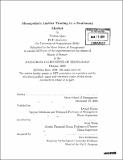| dc.contributor.advisor | Leonid Kogan and Jiang Wang. | en_US |
| dc.contributor.author | Qiao, Zhihua | en_US |
| dc.contributor.other | Sloan School of Management. | en_US |
| dc.date.accessioned | 2009-10-01T15:48:30Z | |
| dc.date.available | 2009-10-01T15:48:30Z | |
| dc.date.copyright | 2008 | en_US |
| dc.date.issued | 2009 | en_US |
| dc.identifier.uri | http://hdl.handle.net/1721.1/47831 | |
| dc.description | Thesis (S.M.)--Massachusetts Institute of Technology, Sloan School of Management, February 2009. | en_US |
| dc.description | Includes bibliographical references (p. 93). | en_US |
| dc.description.abstract | This paper examines trading behavior of market participants and how quickly private information is revealed to the public. in a stationary financial market with asymmetric information. We establish reasonable assumptions, under which the market is not efficient in the strong form. in contrast to the Chau and Vayanos (2008) model. First, we assume that the insider bears a quadratic transaction cost. We find that the trading intensity of the insider is inversely related to transaction cost and that the market maker's uncertainty about private signals is positively related to transaction cost. As transaction cost approaches zero, the economy converges to that of the Chau and Vayanos (2008) model. Second, we assume that the insider can observe signals only discretely and at evenly spaced times, at a lower frequency than that at which trading takes place. The sparseness of signals induces insiders to trade patiently before the next signal comes in, as in the finite horizon model of Kyle (1985). Furthermore, the degree of market efficiency declines as signals arrive more sparsely. Finally, we assume that arrival times of private insider signals are random. In such case, the insider is less patient and trades more smoothly than with fixed arrival times As a result. market prices incorporate private information more quickly. | en_US |
| dc.description.statementofresponsibility | by Zhihua Qiao. | en_US |
| dc.format.extent | 93 p. | en_US |
| dc.language.iso | eng | en_US |
| dc.publisher | Massachusetts Institute of Technology | en_US |
| dc.rights | M.I.T. theses are protected by
copyright. They may be viewed from this source for any purpose, but
reproduction or distribution in any format is prohibited without written
permission. See provided URL for inquiries about permission. | en_US |
| dc.rights.uri | http://dspace.mit.edu/handle/1721.1/7582 | en_US |
| dc.subject | Sloan School of Management. | en_US |
| dc.title | Monopolistic insider trading in a stationary market | en_US |
| dc.type | Thesis | en_US |
| dc.description.degree | S.M. | en_US |
| dc.contributor.department | Sloan School of Management | |
| dc.identifier.oclc | 429508689 | en_US |
